NATO's enlargement and Europe's security architecture will be incomplete until Bosnia takes up its place as a member of the Alliance.
For weeks prior to and after the November presidential elections in the US, Bosniak pundits were ecstatic about Joe Biden. Not to be left out, academics and journalists joined in the chorus, asserting Biden's commitment to Bosnia and predicting confidently that on assuming office he would quickly resolve to sort out the stalemate that has plagued the Balkan country for years. The memory of then-Senator Biden speaking up eloquently for Bosnia as the war raged in the 1990s was still fresh. In fact, Biden belonged to a group of congressional hawks who had persistently supported Bosnia's right to self-defence in the face of Serbian military superiority and a UN-imposed arms embargo. Observers assumed that the new president would take up the cause of Bosnia now as he had almost three decades ago. Yet, more than a hundred days into the Biden administration, the euphoria has subsided, as Washington tackles an array of domestic and foreign policy priorities.
Inflated expectations notwithstanding, this corner of Europe warrants the president's attention on one particular issue. If the 46th president wants to secure the historical powder keg of Europe with an eye on his legacy, the NATO summit this June presents an opportunity. President Biden should fast-track Bosnia's NATO accession.
Apart from Bosnia, most of the region is moving forward towards NATO membership. NATO enlargement in the post-Yugoslav space has so far proceeded successfully, with Slovenia joining in 2004 and Croatia following suit in 2009. Montenegro joined NATO in 2017, and North Macedonia became the latest state to join the Alliance last year. This effectively leaves Bosnia, Serbia and Kosovo on NATO's periphery. While Serbia remains adamant that it will stay out of NATO and Kosovo's path to membership is far less clear, Bosnia is in the Membership Action Plan (MAP) – a stepping stone to full membership.
Strategically, NATO should finalise the process of enlargement in the former communist countries that began in the 1990s during the Clinton administration. With Russia and China making inroads in the Balkans, the strategic imperative becomes all the more apparent. The US's diplomatic drawdown over the past decade has led to a power vacuum and the rise of anti-US and anti-NATO sentiment, particularly in the Bosnian Serb entity of Republika Srpska. Just over a decade ago, in 2009, the then-Serb member of the Bosnian presidency, Nebojša Radmanović, sent a letter to NATO expressing Bosnia’s commitment to becoming a full member of the Alliance. What has changed since then is that Bosnian Serb leaders have officially taken a more anti-NATO and pro-Russian stance. In sabotaging popular support for NATO, Bosnian Serb nationalist leader Milorad Dodik’s propaganda machinery launched two arguments which have taken root: that Republika Srpska can block Bosnia’s NATO membership, and that a referendum on NATO would decide the country’s future in the Alliance.
In fact, the decision on NATO membership has been on the books since 2005, when the Law on Defence was adopted. Article 84 stipulates that 'the Parliamentary Assembly, the Council of Ministers, the Presidency and all institutions of defence will undertake all necessary steps within the constitutional and legal framework with a view to Bosnia and Herzegovina's membership of NATO'.
In 2010, Bosnia was invited to join the MAP on the condition that it registered immovable defence properties. Nine years later, in December 2019, NATO accepted Bosnia's Annual National Program and it is now participating in the MAP. In November 2018, Bosnia adopted a new foreign policy strategy document which reaffirms that 'continuation of activities related to NATO remain a priority of the institutions of Bosnia and Herzegovina. Activities will be prioritised with a view to activation and implementation of MAP'. While NATO remains a priority, the absence of a clear-cut objective of full membership is evident in this document. Still, the country's cooperation with NATO has been reaffirmed with the support of Bosnian Serb leaders at the state level. Furthermore, even if a referendum were to be held on NATO membership, it would need to be conducted in both Republika Srpska and the Federation. In other words, the result of a countrywide – as opposed to an entity-wide – referendum would be the only meaningful one.
There is an intriguing twist to Dodik's anti-NATO politics. For all the focus on his anti-US and anti-NATO views, the Bosnian Serb leader – who was sanctioned by the US Treasury Department in 2017 for obstructing the Dayton Peace Accords – has not put up any substantial roadblocks to the country’s increasing cooperation with the Alliance. In fact, Dodik has greenlighted moves towards increased cooperation, including Bosnia’s participation in the US-led Defender Europe 2021 exercise. The threat of additional US sanctions, in tandem with potential EU travel bans and asset freezes, would soften any further opposition to Bosnia’s path towards NATO membership.
With the accession of Montenegro and North Macedonia, there was a sense in the Balkans that the region was moving forward. In Bosnia, hope that some of the tensions inherent in the Dayton Peace Accords could be ameliorated rests on the country joining NATO and the EU. Without a clear prospect of membership in the near term, Bosnia will continue to be marred by ethnic disputes and could risk slipping into a frozen conflict.
In an increasingly multipolar world, with the US challenged on multiple fronts, the Balkans remains a region where the US is both heavily invested and where it is still popular. Failing to absorb Bosnia into NATO could – in the years ahead – stir a debate over ‘who lost the Balkans’. To forestall such a scenario, the Biden administration should push for Bosnia’s NATO accession this June.
Hamza Karčić is an associate professor at the Faculty of Political Science at the University of Sarajevo.
The views expressed in this Commentary are the author's, and do not represent those of RUSI or any other institution.

